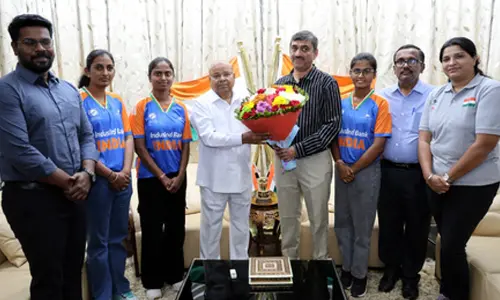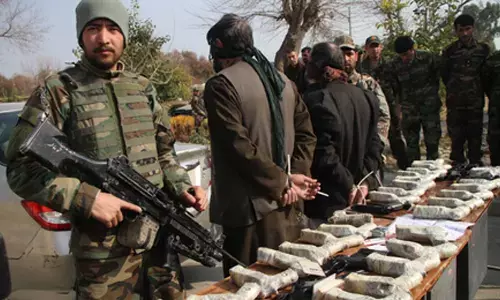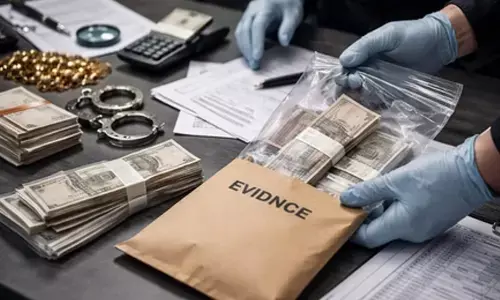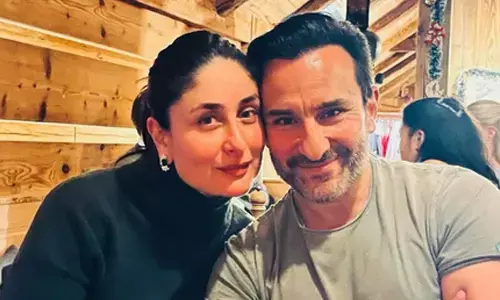VC Shukla : Emergency era's hatchet man

 Vidya Charan Shukla, who died Tuesday, will be remembered for imposing censorship on the media and putting journalists, including top editors, behind bars. He was former prime minister Indira Gandhi's hatchet man during the much-detested Emergency era (1975-77) when he was the information and broadcasting minister.
Vidya Charan Shukla, who died Tuesday, will be remembered for imposing censorship on the media and putting journalists, including top editors, behind bars. He was former prime minister Indira Gandhi's hatchet man during the much-detested Emergency era (1975-77) when he was the information and broadcasting minister.
Shukla, who was close to Indira Gandhi's younger son Sanjay Gandhi, used to act like an extra-constitutional authority during the Emergency period. He cut power supply to newspaper printing presses, imposed restrictions on free media operations, harassed and imprisoned journalists, and personally monitored stories for their stance towards the government.
Shukla's role as Information and Broadcasting Minister during the Emergency days had got him some odium as propagandist for Indira Gandhi's government. His ministry attracted adverse attention for the media censor policy during that period when freedom of speech was under attack. The Justice Shah Commission of Inquiry which went into the Emergency execesses, had observed among other things that "During the Emergency some of these dramatis personae such as Bansi Lal, V C Shukla, Sanjay Gandhi exercised powers like medieval despots."
At the height of his power, Shukla even banned songs of popular singer Kishore Kumar from All India Radio and Doordarshan after the artiste refused to perform at a Congress rally in Mumbai. Shukla, who started his political career with the Congress, was an opportunistic mover on the quicksand of Indian politics. In 1957, he won from the Mahasamund Lok Sabha constituency in Madhya Pradesh as a Congress candidate.
He was elected to the Lok Sabha nine times in subsequent elections. Shukla deserted the Congress for the first time in 1977 when Indira Gandhi was voted out. Her son and then prime minister Rajiv Gandhi rehabilitated him after Indira Gandhi's assassination in 1984, but Shukla again quit the party along with VP Singh to form the Jan Morcha in 1989. He was a minister in VP Singh's National Front government formed after elections the same year, but when it fell, he went over to Samajwadi Janata Party and was again a minister in the Chandrashekhar government.
After Chandrashekhar lost the 1991 elections, he came back to Congress under then prime minister PV Narasimha Rao. But he again left the Congress in 2003 after being denied the chief ministership of Chhattisgarh, when it was carved out of Madhya Pradesh in 2000.
Shukla joined the Nationalist Congress Party (NCP) in 2003. The next year, just ahead of the 2004 parliamentary polls, he joined the Bharatiya Janata Party and contested from Mahamsamund on a party ticket, but lost to Congressman and former chief minister Ajit Jogi. He left the BJP the same year and rejoined Congress in 2007. Shukla was born on August 2, 1929, at Raipur, Central Provinces and Berar. His father Pt Ravishankar Shukla was a lawyer, freedom fighter, veteran Congressman, Premier of Central Provinces and Berar and the first Chief Minister of reorganised Madhya Pradesh.
His elder brother, Shyama Charan Shukla, was also a state chief minister. Shukla graduated from Morris College, Nagpur in 1951. The same year he married Sarla. He had three daughters. He also served in the ministries of external affairs, parliamentary affairs, water resources, defence, home, communications, finance, planning and civil supplies.
Shukla, who was close to Indira Gandhi's younger son Sanjay Gandhi, used to act like an extra-constitutional authority during the Emergency period. He cut power supply to newspaper printing presses, imposed restrictions on free media operations, harassed and imprisoned journalists, and personally monitored stories for their stance towards the government














